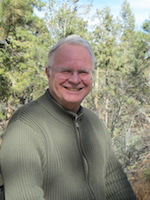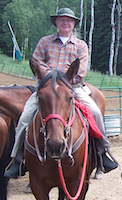
Bob Dryja has been volunteering at PEEC for the last 12 years, first with some of the children’s programs, and more recently as a Board member (though he still volunteers to help out with field trips and such!). Bob always has a smile on his face, a joke to tell, and he is always willing to lend a hand. PEEC sat down with Bob to learn more about him.
PEEC: How did you get involved with PEEC?
B.D.: Oh that goes back almost 12 years! Michele Altherr was looking for people to help with LEAP [Living Earth Adventure Program] and Nature Odyssey, so I responded because I thought it would be fun to help with Nature Odyssey – it would be cool to be stuck in the Valle Grande for a week! That’s how I became involved with PEEC. I like the idea of getting kids outdoors into the high country of the Valle Grande or the Rio Grande valley for daily field trips. Over time, the programs have evolved, and now its with another generation of parents.
PEEC: What is your current role?
B.D.: After a while, I became more involved with the Board and setting direction for the organization. I currently serve as a board member, having been on the board for roughly 8 years. PEEC began as an active group of volunteers, and it has evolved into something more “corporate” as we move forward with the plans for the new Nature Center. It’s been a transition, but in a good way. It’s something new and improved, but the people involved with PEEC have been able to keep their enthusiasm and can-do attitude from past.
PEEC: What has kept you involved as a volunteer all these years?
B.D.: I’d have to say it’s the simple pleasure of actually personally accomplishing the mission statement, to help people enrich their lives by strengthening their connections with our canyons, mesas, mountains and skies. I can say that’s true for myself, too.
PEEC: What do you see when you look to the future for PEEC?
B.D.: With the new Los Alamos County Nature Center opening in Spring, 2015 [to be run by PEEC], I’m interested in seeing if there could be more adult programs developed that have a regional appeal. For example, my sister is a birder in California. She would be interested in going to the Bosque with New Mexico birders, and then reciprocating by introducing them to birding opportunities in her neck of the woods. People come from all around the country to learn about the Jemez, the Native American pueblos, etc. PEEC will also be able to draw these visitors in the future.
PEEC: What would our community look like without PEEC?
B.D.: In its own way, PEEC provides meaning and purpose to life. Look at people in the sciences. They are heavily involved with analysis and detail, but at some point, you have to step back and ponder what is the meaning or purpose of all of this? If you go out and look at nature, you can understand the meaning – it’s global, spiritual.

PEEC: Can you tell us something else interesting about you?
B.D.: When I was growing up, my dad was the engineer in charge of running the Panama Canal, so I grew up in that region. As a result, I am very much of an internationalist. The Canal Zone was a small place, but there were people from all around the world who came there. People were constantly involved in doing interesting things, and that gave me an appreciation for being around interesting people, like the people at PEEC.
PEEC: Is there anything you would like to leave us with?
B.D.: I’ve noticed that there are a relatively few number of men involved with PEEC. We need to get guys out and involved!
